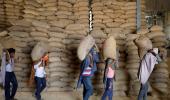If states have to fall in line with MSPs declared by political parties, they will have to do so in violation of central order or bear the full expense of the surplus procured at above MSP rates.

The euphoria of the BJP poll victories in Madhya Pradesh, Rajasthan, and Chhattisgarh, and the Congress's triumph in Telangana, mask a looming challenge: Fulfilling the promise of substantial increases in the minimum support price (MSP) for wheat and paddy.
This is particularly significant because three of the four states where election results were announced on Sunday contribute significantly to the central pool stocks of wheat and rice each year.
In Madhya Pradesh, the ruling BJP has promised an MSP (this is likely to be inclusive of a bonus as states aren't authorised to declare MSP but they can add bonus to it) that is 18.68 per cent higher than the current MSP.
In Chhattisgarh, it has promised an MSP that is 42 per cent higher than the Centre-fixed MSP for "common grade" paddy for 2023-24.
In Telangana, the Congress has announced a paddy bonus of Rs 500 per quintal over the MSP, which will push up the purchase price by almost 23 per cent compared to the current MSP.
The central government, through an official letter issued in 2014, had discouraged states from declaring bonuses over MSPs.
The letter stated that if a surplus decentralised procurement (DCP) state declares a bonus over MSP, the Centre would limit its procurement for the central pool only to the extent required for managing the public distribution system in the state.
And, if a non-DCP state declares a bonus over MSP, the Centre won't participate in the central pool procurement of wheat and paddy in the state.
Later, the central government, through its procurement agencies, entered into multiple Memoranda of Understanding (MoUs) with procuring states to limit its procurement only to the extent of what is required for managing the public distribution system (PDS) in DCP states.
The central letter was issued to ensure that states don't arbitrarily declare bonuses over MSPs, which invariably leads to excess procurement and production.
Central agencies are saddled with stocks which are in far excess of that which is required for PDS operations.
This, in turn, leads to a spike in the storage and transportation of the grains, pushing up the economic cost that further burdens the national exchequer.
If states have to fall in line with MSPs declared by political parties, they will have to do so in violation of this central order or bear the full expense of the surplus procured at above MSP rates.
Or else, MSPs announced now will have to be implemented nationally by the central government to share the states' financial burden.
This is problematic as such a sharp rise in MSP nationally and even in major producing states could have a big inflationary impact and, for crops like paddy, hurt India's export competitiveness in the world market.
Abnormally high paddy prices could outprice Indian rice from the world markets as and when full exports are allowed.
Crop diversification efforts could come to naught if too much incentive is given for growing paddy and wheat.
Some traders said if paddy purchase price is around Rs 32-31 per kg, it would mean that rice won't sell much below Rs 45-50 in the domestic markets
One way to skirt this is to do what Shivraj Singh Chouhan did in 2018.
He announced a scheme called "Mukhyamantri Kisan Samriddhi Yojana (Chief Minister Farmers Promotion Scheme)" under which it provided an incentive of Rs 265 per quintal to all wheat farmers irrespective of the fact whether he/she sells at MSP or not.
The incentive was outside the MSP mechanism.


Feature Presentation: Aslam Hunani/Rediff.com












 © 2025
© 2025